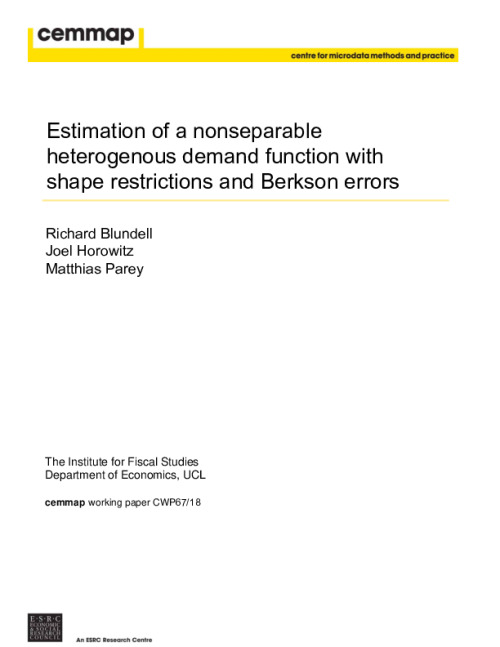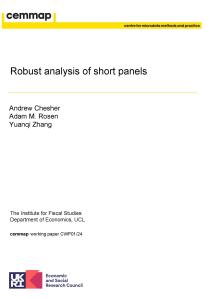Downloads

CWP671818.pdf
PDF | 429.82 KB
Berkson errors are commonplace in empirical microeconomics and occur whenever we observe an average in a specified group rather than the true individual value. In consumer demand this form of measurement error is present because the price an individual pays is often measured by the average price paid by individuals in a specified group (e.g., a county). We show the importance of such measurement errors for the estimation of demand in a setting with nonseparable unobserved heterogeneity. We develop a consistent estimator using external information on the true distribution of prices. Examining the demand for gasoline in the U.S., accounting for Berkson errors is found to be quantitatively important for estimating price effects and for welfare calculations. Imposing the Slutsky shape constraint greatly reduces the sensitivity to Berkson errors.
Authors

CPP Co-Director
Richard is Co-Director of the Centre for the Microeconomic Analysis of Public Policy (CPP) and Senior Research Fellow at IFS.

Northwestern University

Research Fellow University of Surrey
Matthias is a research Fellow of the IFS, a Professor in the School of Economics at the University of Surrey and a Research Fellow at the IZA.
Working Paper details
- DOI
- 10.1920/wp.cem.2018.6718
- Publisher
- The IFS
Suggested citation
R, Blundell and J, Horowitz and M, Parey. (2018). Estimation of a nonseparable heterogenous demand function with shape restrictions and Berkson errors. London: The IFS. Available at: https://ifs.org.uk/publications/estimation-nonseparable-heterogenous-demand-function-shape-restrictions-and-berkson (accessed: 25 April 2024).
More from IFS
Understand this issue

Gender norms, violence and adolescent girls’ trajectories: Evidence from India
24 October 2022

Public investment: what you need to know
25 April 2024

The £600 billion problem awaiting the next government
25 April 2024
Policy analysis

IFS Deputy Director Carl Emmerson appointed to the UK Statistics Authority Methodological Assurance Review Panel
14 April 2023

ABC of SV: Limited Information Likelihood Inference in Stochastic Volatility Jump-Diffusion Models
We develop novel methods for estimation and filtering of continuous-time models with stochastic volatility and jumps using so-called Approximate Bayesian Compu- tation which build likelihoods based on limited information.
12 August 2014

Is there really an NHS productivity crisis?
17 November 2023
Academic research

Understanding Society: minimising selection biases in data collection using mobile apps
2 February 2024

Sample composition and representativeness on Understanding Society
2 February 2024

Robust analysis of short panels
8 January 2024